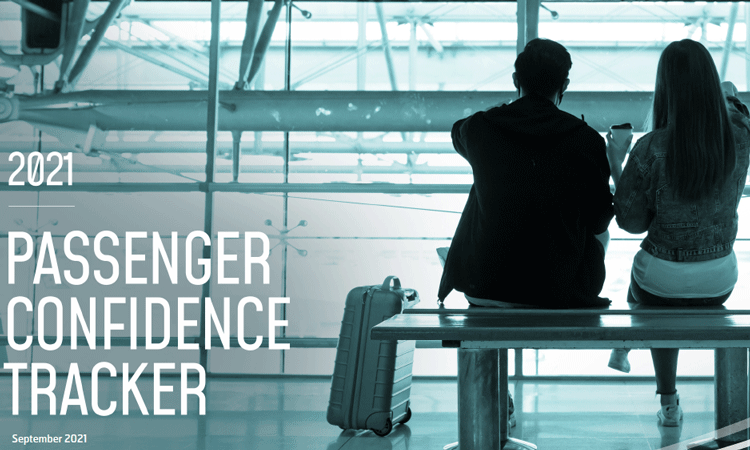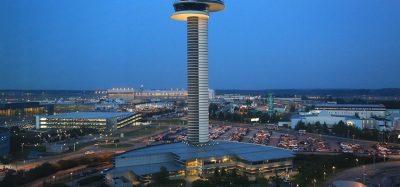New passenger survey reveals restoration of passenger confidence in air travel
- Like
- Digg
- Del
- Tumblr
- VKontakte
- Buffer
- Love This
- Odnoklassniki
- Meneame
- Blogger
- Amazon
- Yahoo Mail
- Gmail
- AOL
- Newsvine
- HackerNews
- Evernote
- MySpace
- Mail.ru
- Viadeo
- Line
- Comments
- Yummly
- SMS
- Viber
- Telegram
- Subscribe
- Skype
- Facebook Messenger
- Kakao
- LiveJournal
- Yammer
- Edgar
- Fintel
- Mix
- Instapaper
- Copy Link
Posted: 15 September 2021 | International Airport Review | No comments yet
The Passenger Confidence Tracker reveals demand for flights is restoring, however, rebuilding passenger confidence requires consistent global safety protocols and digital technology.


Credit: Inmarsat
Inmarsat has unveiled the findings of its Passenger Confidence Tracker 2021, with 60 per cent of passengers feeling happy to fly by the end of the year, compared to only 47 per cent last year.
Airlines will also be reassured that the number of passengers, who expect to travel less frequently has dropped by 6 per cent in comparison to Inmarsat’s 2020 Passenger Confidence Tracker. However, with 84 per cent of respondents believing their travel habits are likely to change post-COVID-19 pandemic, the onus is firmly on airlines to ensure their service offering keeps pace with the evolving requirements of passengers.
Passenger confidence levels on the rise
In total, 60 per cent said they would happily take to the skies by the end of the year (2021), with air passengers in Greece the most confident about flying with an airline, 29 per cent, followed by Australians and Brazilians, both 20 per cent. Interestingly, taking a flight improves the confidence of airline passengers towards health and safety issues by 20 per cent, showing that the experience of flying is very reassuring.
When it comes to COVID-19 concerns, one in three people, 37 per cent, felt less confident taking a bus or coach compared to a flight. This was highest for passengers in Brazil, 70 per cent, India, 48 per cent, and UAE, 42 per cent. Globally, 40 per cent of passengers felt the metro or underground was riskier than flying.
Philip Balaam, President of Inmarsat Aviation, said: “There is no denying that the past 18 months has been a turbulent time for airlines and passengers alike. However, the latest International Air Transport Association (IATA) figures show that demand for both international and domestic travel is gaining significant momentum. To maintain and even accelerate this growth, it’s essential to rebuild passenger confidence and ensure their evolving needs are met in a post COVID-19 world.
“Our latest Passenger Confidence Tracker offers detailed insights into the main areas of confidence and concern around air travel, direct from the passengers themselves. Such findings will allow airlines to increase their focus on key priorities and seize the exciting opportunities ahead as the industry continues its long-term recovery.”
Barriers remain, but customer experience boosts confidence
Certain barriers to flying are still evident and primarily centre around the inconvenience and unpredictability of travel. The top three barriers globally were quarantining (51 per cent), unpredictable border closures (41 per cent) and confusing safety protocols (36 per cent).
Following the COVID-19 pandemic, the passenger service experience was regarded as the most important factor when it comes to the enjoyment of a flight globally, 46 per cent, with the highest responses coming from India, 67 per cent, Brazil, 67 per cent, Indonesia, 59 per cent and China, 57 per cent.
When it comes to health and safety, 84 per cent of passengers believe that implementing COVID-19 vaccine passports is a good idea, with 50 per cent stating COVID-19 passports should be implemented now and 34 per cent stating it should only be implemented when everyone’s been offered the vaccine. The remaining 16 per cent either did not think COVID-19 vaccine passports are fair on those who are against being vaccinated, had concerns around the use of personal data, or did not have an opinion on the matter.
The survey also indicates that greater importance should be placed on customer experience, because interacting with airline personnel was seen to help instill the most confidence for passengers during a flight. This made passengers the most confident in Mexico, 55 per cent, the U.S., 51 per cent, UAE, 50 per cent, Brazil, 49 per cent, Greece, 42 per cent, Canada, 41 per cent, Australia, 39 per cent and the UK, 36 per cent.
Passengers demand greater predictability and consistency
The survey reveals that the unpredictability of flying and the seemingly large variation in rules and regulations is hampering confidence towards air travel the most. As referenced, the potential of quarantine is the greatest worry for people, 51 per cent, more so than catching COVID-19 at the airport or on the plane, 43 per cent. Furthermore, 62 per cent would like all airlines to follow the same hygiene practices, which comes out as the most important factor for Australians, 63 per cent. A consistent set of safety standards was the most important factor for nations in Asia Pacific too, namely Indonesia, Japan, and Singapore.
Technology helps to improve confidence
Digital technology improves pre-flight confidence in several ways, such as providing up-to-date information and updates to help reassure passengers before a journey. Digital health passports were also found to be a pre-flight confidence booster in 2021’s survey, with their importance rising to 47 per cent compared to 37 per cent in 2020. Greece is the only country that has concerns about digital health passports, 36 per cent, both in terms of personal data and fairness and 12 per cent of passengers in the UAE, Japan, Canada, and Germany felt they were unfair. Other important digital pre-flight activities include destination status alerts, 39 per cent, facial recognition security, 33 per cent and real time luggage tracking, 31 per cent.
While onboard, digital technology helps to improve confidence by keeping passengers connected and minimising their contact with others, including cabin crew and fellow passengers. In addition, 41 per cent of respondents believed inflight Wi-Fi had increased in importance after the COVID-19 pandemic, compared to 30 per cent for inflight entertainment. Inflight Wi-Fi was the most important factor for the U.S., 55 per cent and Canada, 41 per cent.
“A digital transformation was already underway in the aviation industry, but the -COVID-19 pandemic has undoubtedly fast-tracked its implementation,” added Balaam. “As the trusted connectivity provider for airlines throughout the world, Inmarsat has experienced higher passenger usage for our inflight broadband solutions compared to pre-COVID-19 levels, showing the desire to stay connected has only amplified. Airlines are also embracing innovating new ways to enhance their onboard experience using connectivity, with a major focus on touchless experiences in keeping with today’s passenger expectations.”
Airline reputation and trust is paramount
Globally, satisfaction with airlines’ responses to the pandemic has grown to 72 per cent, a 12 per cent increase from 2020. This is an important result for the industry, as the reputation of airlines is the key to boosting confidence levels for 50 per cent of passengers. In addition, more passengers said they will only travel with ‘trusted’ airlines, which was most pronounced in the U.S. with an 8 per cent uplift from 2020 to 32 per cent. The research also reveals generational differences, as 28 per cent of younger passengers (18 to 44 years) said they were more likely to fly only with ‘trusted airlines’ compared to 20 per cent of older passengers (45 to 65 years).
A more discerning passenger
The study also reveals that factors such as region and age influence the individual preferences of passengers. In the U.S., passengers report that inflight Wi-Fi, the passenger service experience, and inflight entertainment are more important now than before the COVID-19 pandemic. In comparison, passengers in EU, the Middle East and Africa (EMEA) consider free baggage and extra legroom as more important. Younger passengers aged 18 to 44, are more concerned with catching COVID-19 according to the study, as well as more discerning when they select a carrier than older passengers, placing far more importance on loyalty programmes, sustainability, airport locations and ticket prices.
Related topics
Airport crisis management, Airport development, Airside operations, Contactless / Touchless technology, COVID-19, In-flight activity, Passenger experience and seamless travel, Passenger volumes, Safety, Self-service, Wi-Fi
Related organisations
Related regions
Africa, Asia Pacific and Oceania, Central and South America, Europe, Middle East, North America, United Kingdom and Ireland


















